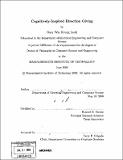| dc.contributor.advisor | Howard E. Shrobe. | en_US |
| dc.contributor.author | Look, Gary Wai Keung, 1978- | en_US |
| dc.contributor.other | Massachusetts Institute of Technology. Dept. of Electrical Engineering and Computer Science. | en_US |
| dc.date.accessioned | 2009-01-30T16:44:00Z | |
| dc.date.available | 2009-01-30T16:44:00Z | |
| dc.date.copyright | 2008 | en_US |
| dc.date.issued | 2008 | en_US |
| dc.identifier.uri | http://hdl.handle.net/1721.1/44415 | |
| dc.description | Thesis (Ph. D.)--Massachusetts Institute of Technology, Dept. of Electrical Engineering and Computer Science, 2008. | en_US |
| dc.description | Includes bibliographical references (p. 133-140). | en_US |
| dc.description.abstract | Online mapping services and portable GPS units make it easy to get very detailed driving directions. While these directions are sufficient for an automaton to follow, they do not present a big picture description of the route. As a result, while people can follow these detailed turn-by-turn directions, it can be difficult for them to actually comprehend where they are going. Our goal is to make such directions more comprehensible. Our approach is to apply findings from human spatial cognition, the study of how people conceptualize and organize their knowledge of large-scale space, to create a system that generates written route overviews. Route overviews provide a big picture description of a route, and are intended to supplement the information in turn-by-turn directions. Our route overviews are based on cognitively-inspired design criteria such as: the use of spatial hierarchy, goal-directed descriptions, selective suppression of detail, and the use of the trunk segments and cognitive anchor points along the route. In our experiments, we show that we can make directions more comprehensible independent of the particular places a person knows - by using what we know about how people think about space to structure the way we present spatial information. | en_US |
| dc.description.statementofresponsibility | by Gary Wai Keung Look. | en_US |
| dc.format.extent | 140 p. | en_US |
| dc.language.iso | eng | en_US |
| dc.publisher | Massachusetts Institute of Technology | en_US |
| dc.rights | M.I.T. theses are protected by
copyright. They may be viewed from this source for any purpose, but
reproduction or distribution in any format is prohibited without written
permission. See provided URL for inquiries about permission. | en_US |
| dc.rights.uri | http://dspace.mit.edu/handle/1721.1/7582 | en_US |
| dc.subject | Electrical Engineering and Computer Science. | en_US |
| dc.title | Cognitively-inspired direction giving | en_US |
| dc.type | Thesis | en_US |
| dc.description.degree | Ph.D. | en_US |
| dc.contributor.department | Massachusetts Institute of Technology. Department of Electrical Engineering and Computer Science | |
| dc.identifier.oclc | 289380906 | en_US |
